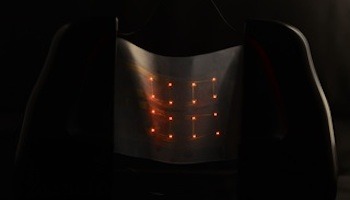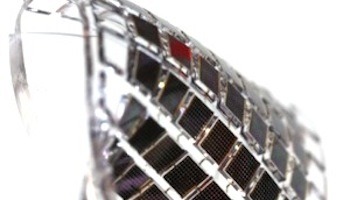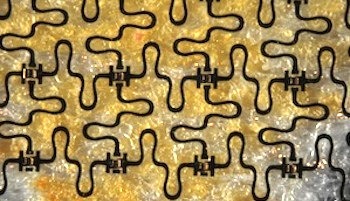Wearable Technology Startup mc10 Grabs Army Contract And Chats With SlashGear
This afternoon we got the chance to exchange words with mc10 co-founder Ben Schlatka on how the company's "electronics anywhere" tagline is being made a reality right here and now. Not only are they developing wearable technology for Medical and Industrial projects, they've also got consumer technology in the pipeline – and with their new R&D contract that includes Wearable Electronics for the Battlefield with NSRDEC, you'll see how the modern soldier will soon be benefitting in full from renewable power sources that are as natural to wear as a helmet.
Again we're speaking with mc10 co-founder Ben Schlatka, and for those of you looking for more information on getting in contact with the crew, you can head to their page over at mc10inc.com – and tell em SlashGear sent ya! Have a peek here at our very brief but very informative conversation below.

[Q] How do you see wearable technology fitting in with the rather mobile consumer landscape of today ?
[Ben Schlatka] There is increasingly strong market demand to measure everything about the body. And there are a number of wearable devices available that are trying to address this need. Unfortunately, most of these devices are bulky and uncomfortable to wear, and the quality of the data they provide varies widely.
MC10 is reshaping conventional rigid high-performance electronics into ultra-thin form factors that conform to the body. Imagine a kids' fake tattoo that can sense how our bodies work: data from the heart, the brain, muscles, body temperature – even hydration levels. When a sensing technology conforms to the consumer and not the other way around, it can capture more insights for longer periods of time without discomfort or distraction.

[Q] I understand you've just secured an R&D contract for Wearable Electronics for the Battlefield with NSRDEC [US Army Natick Soldier Research, Development, and Engineering Center] – could you talk a little bit about that?
[S] This is an exciting project, we're working with the NSRDEC to develop a renewable power source that extends the capabilities of soldiers in the field. The modern soldier carries lots of high-tech gear but they can't be effective if the devices run out of power. We're developing solar cells that are integrated directly into the fabric of helmets and rucksacks so devices can be charged and ready to use at all times. And it sure beats lugging a battery around in addition to the gear our troops already carry.
Now imagine the design freedom this technology provides. Something like your jacket can serve the same purpose. As you go about your day, your jacket is collecting energy that you can use to charge your phone or other portable electronic devices. You no longer have to search the coffee shop or airport lounge for a free outlet.
This is where the technology is heading, and it's not too far off in the future.

[Q] How do you predict wearable technology will reach the mainstream?
[S] Wearable technologies will only go mainstream if they can be virtually invisible to the user. If your sleep monitor is bulky and keeps you from falling asleep, what good is it? If your doctor wants you to monitor your hear rate and it requires wearing an uncomfortable device, what are the odds you'll actually comply?
Today we conform to our electronics without even thinking much about it, we've adapted because the pros outweigh the cons. But as electronics increasingly conforms to us, the barriers to adoption decrease.

[Q] Are there examples of mc10 that are live and out in the wild right now that you'd like to share?
[S] Nothing 'in the wild' until later this year, we're developing a new device with Reebok that is expected to launch in 2012. We've also convened a team of accomplished athletes and experts across a variety of sports to help us shape the next generation of athletic performance monitoring.
We are also really excited about the important role our technology can play empowering people to play a more active role in staying healthy. Given the skyrocketing cost of healthcare, it's clear we need smarter, cheaper ways to monitor health status outside of the hospital. Today, we learn about our health very occasionally and episodically; as a result, we access care in a costly setting, often when a condition has worsened to extreme levels. By providing continuous access to high-quality biofeedback at an affordable cost, MC10 is empowering people to take more ownership of their health, and to take action in real-time, accessing care only if and when it's needed.

